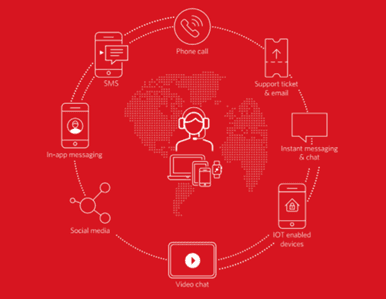What is an Omnichannel Contact Center?
In an omnichannel contact center, all communication channels (e.g., phone, SMS, online chat, and email) connect and integrate to provide a seamless customer experience. Omnichannel contact centers also let agents switch between channels with a single user interface without losing context from customer interactions across channels.
The terms multichannel and omnichannel are often confused, despite meaning different things. Many companies claim to offer omnichannel communications when really it's a multichannel approach, while others recognize there's still a way to go. In fact, according to Twilio Segment's State of Personalization Report, only 35% of businesses claim to have a successful, personalized omnichannel approach.
Companies that connect with customers via multiple channels—such as email, social media, chat, and telephone—have a multichannel contact center. However, just because customers connect with you via multiple channels doesn't mean that their experience is seamless.
For example, an agent who connects with a customer by phone may not have any information about that customer's previous interactions on live chat. This is because channels are typically siloed in multichannel contact center channels—meaning agents can't see the context from interactions customers had on other channels, which limits the level of service they can provide.
Giving your customers the ability to seamlessly switch between channels is what takes your customer journey to a whole new level. Enter the omnichannel contact center, which lets agents follow a customer conversation wherever it goes, without being boxed into one channel or spread across dozens of tabs.
When your customer can begin with a chat session on your website and then switch to a video co-browsing session or voice call with an agent, you can offer that customer more personalized, higher-quality service. This seamless interaction across channels is the key to a great omnichannel experience.
Although the literal translation of omni is all, an omnichannel contact center isn't necessarily operating on every possible channel (in today's technology landscape, these are constantly changing anyway). However, all the channels it does operate on are connected. This allows you to provide continuity and personalized customer service. Additionally, with an omnichannel contact center solution, agents can see the entire customer journey through real-time dashboards. This means they can look at trends over time and by channel while tracking the metrics that matter to the business.

Your business can even customize the omnichannel dashboard for your specific needs and integrate it with your customer relationship management and other relevant platforms. This takes the mystery out of the customer journey by giving you visibility and extensive reporting and analytics.
Along with the visibility of the dashboard, an omnichannel approach also allows for a level of personalization that a multichannel contact center can't provide. The impact on the bottom line is undeniable—49% of consumers say they're more likely to become repeat customers after a personalized shopping experience.
Integrating your communication channels and providing seamless context throughout the customer journey—especially in a complex environment like a contact center—requires the right infrastructure. This makes omnichannel difficult to achieve with out-of-the-box contact centers. However, that's true of any system that requires a lengthy installation process and has limited features and integration with other platforms—it can't provide the agility needed to deliver an excellent customer experience.
How do you choose a cloud-based omnichannel contact center solution? For starters, look for a single interface for all channels. You also want the ability to add new channels to your contact center as those channels become popular with your customers. Finally, make sure the solution gives you complete ownership of your customer interaction data across all channels through a single dashboard to set your agents up for success. This is where Twilio APIs come in.
Twilio APIs—such as Programmable Voice, Programmable SMS, Programmable Video, Programmable Chat, and the WhatsApp Business—are architected at every layer to handle an omnichannel system. In other words, Twilio APIs can help you deliver an exceptional omnichannel customer experience, step by step. Not to mention, Twilio Flex brings all the channels together in one powerful platform, and you can deploy it in a matter of days. To find out more, check out the resources below.